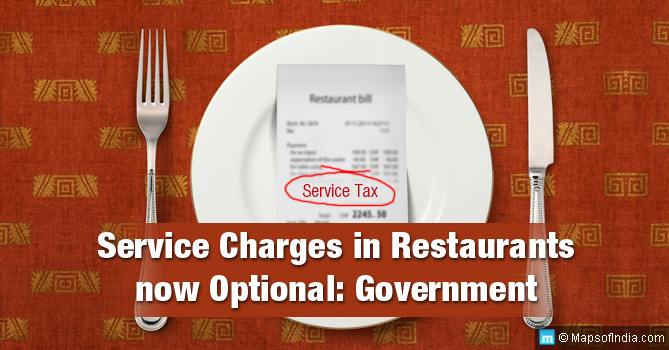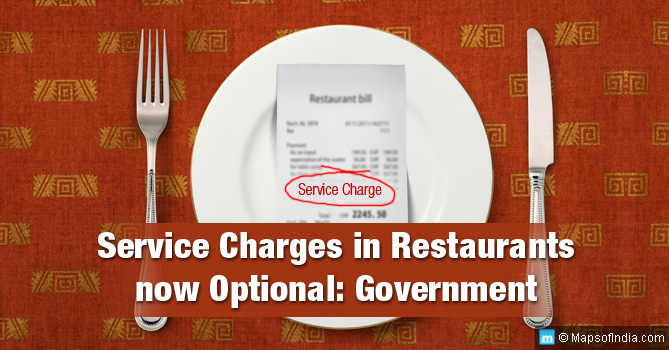The Department of Consumer Affairs on Monday, January 2, 2017, issued a directive to states to instruct all hotels and restaurants to make payment of service charge ‘optional’ for customers. It also directed restaurant and hotel owners to prominently display the message within the premises.
In a rather brazen rejoinder, the National Restaurant Association of India (NRAI) issued a statement saying that customers were free “not to eat” in a restaurant that levied a service charge.
So should consumers rejoice or is this a potential Pandora’s box for confrontation? Very likely, the latter. It is surprising that the government has left open a window to potential confrontation between customers and restaurant owners. And this will certainly rise in the coming days.
Service Tax versus Service Charge
One will be surprised to find the number of naïve customers that do not understand the difference between Service Tax and Service Charge. Service Tax is levied by the state government on the total bill and the same is passed on to the state by the restaurant or hotel owner.
Service Charge, on the other hand, is a ‘charge’ collected by the restaurant or hotel owner as a cost for the service rendered to the customer. While Service Tax is fixed and collected by the government, Service Charge may vary anywhere between 5% and 20% and is at the discretion of the establishment owner.
This raises several issues. First, customers who are not aware of the difference between the two or do not study the bill carefully, often end up paying additional tip, over and above the service charge already collected by the establishment owner.
Second, why should restaurants charge for service delivered in the first place when they have already built in the establishment costs into the price of food that they serve? Why should the customer be made to pay for a service separately whose cost has already been included in the food bill?
Separately, why should the customer be forced to pay a service charge if he or she is not satisfied with the service? If the food is not upto the mark in taste, presentation or quality, the customer still pays the full cost of the bill anyway, so why should the customer fork out additional payment for something he or she is not satisfied with?
And if the restaurant owners start charging for the ‘service’ because they believe it is their ‘right’, then why simply stop at a single service? They could separately also charge for washing the dishes, vegetable-fruits-raw non-vegetarian food cleaning charges, etc. And what about the doorman, bouncers, electrician, food delivery boy, etc., the list could be endless. The logic does not stand.
The government on its part, has smartly played the balancing act by making service charge ‘optional’, thereby keeping the business side happy; and have also pandered to customer’s opposition to paying service charge by keeping it optional.
Customers Could Fight Back
The NRAI has been quite brazen in saying that the customers who did not want to pay service charge were free to go elsewhere. Now, in today’s age of social media and mass opinion generation, if the customers were to unite and name all the restaurants in their localities that collect service charge, and gave a call to boycott them, these restaurants will be on the brink of a shutdown, as none of them would be able to withstand no-show by customers.
That’s all it takes! Remember, in the ongoing ‘notebandi’ crisis, most restaurant owners have been crying foul over revenue drops and using promotions as an effective way of getting people to their diners.
Potential for Conflict
Now, the potential conflict areas. It’s easy for the government to say that customers who are not happy with the service need not pay service charge. At the time of payment of bill, though, one can well expect the service manager to walk up to a customer who denies payment of service charge, demanding to know what aspect of service he or she did not like. The situation could be embarrassing for most customers quite easily.
It’s a demand and supply situation. A popular restaurant with a waiting line outside, won’t hesitate to use this tactic to try and shame the customer instead. The gentle ones would rather pay up and leave quietly, while the few aggressive ones may just take up a fight at the eatery, thereby ruining the dining experience for other guests.
So is this fair on the paying customer? Doesn’t the customer get to decide whether to tip or not, and if so, how much, as has been the practice thus far? The customer is, after all, paying the full price of food along with all establishment costs, anyway.
The Possible Way Out
Traditionally, restaurant owners pay a low salary to employees and rely on customer tips to raise the take-home pay of the restaurant staff. This itself is a wrong practice, as the restaurant owners, most of whom operate on 50% to 150% (or more) profit margins, unethically transfer a part of the business risk to employees.
If the restaurant fails to attract customers on account of food quality, cost, décor or location, the employees are penalized through low wages, since few customers means fewer tips. And they have to make do with the low salary for the entire month. That is unfair to employees.
Possible Solution?
If a service charge must be collected, it should be included in the cost of food and displayed as ‘single price’ on the menu, without ambiguity. This way, there will be no confusion between service tax and service charge, since only service tax will be displayed in the bill. And customers will have no reason for opposition to any other charges.
If the cost of food and overall service quality is acceptable, customers will visit again; otherwise, they will be free to exercise their options and go elsewhere. But this must come as a directive from the government or we will be hearing of more customer-establishment conflicts in the coming days. And that’s not good for either. Is the government listening?
Read More…





